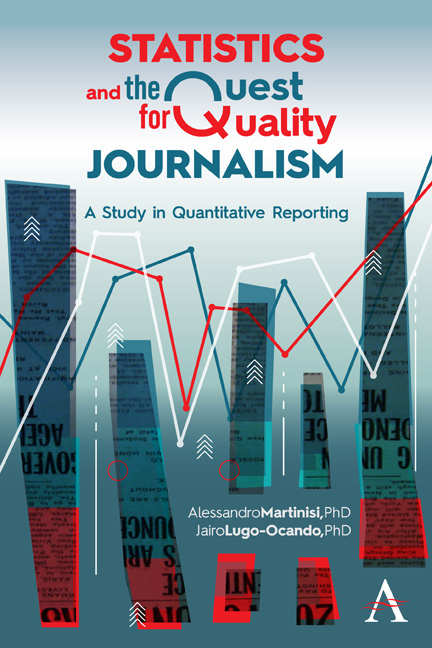Book contents
- Frontmatter
- Dedication
- Contents
- List of Illustrations
- 1 Introduction
- 2 Numbers as Information in the Information Society
- 3 The Never-Ending Debate on Quality in Journalism
- 4 Statistics in Journalism Practice and Principle
- 5 The Normative Importance of ‘Quality’ in Journalism
- 6 Journalism Meets Statistics in Real Life
- 7 The Ideology of Statistics in the News
- Epilogue
- References
- Index
3 - The Never-Ending Debate on Quality in Journalism
Published online by Cambridge University Press: 07 November 2020
- Frontmatter
- Dedication
- Contents
- List of Illustrations
- 1 Introduction
- 2 Numbers as Information in the Information Society
- 3 The Never-Ending Debate on Quality in Journalism
- 4 Statistics in Journalism Practice and Principle
- 5 The Normative Importance of ‘Quality’ in Journalism
- 6 Journalism Meets Statistics in Real Life
- 7 The Ideology of Statistics in the News
- Epilogue
- References
- Index
Summary
As suggested previously, an agreed-upon definition of quality journalism has been, over the years, an ambiguous and problematic issue for both scholars and practitioners. Trying to define what is quality newsgathering and production is a post-modernist labyrinth that can lead to many dead ends as well as mirrors, not least because quality journalism can be conceptualized in a variety of different ways. Moreover, this ample variety of definitions can themselves be more relevant than others within specific national and cultural contexts.
Basically, different people in different countries perceive the concept of quality in the news very differently, and attempting to impose a universal quality criteria carved in stone is a futile exercise in a media industry that defines success largely upon very distinctive economic, cultural and political criteria.
In addition to this, judgements of quality are often culture-specific or related to one's socio-economic background and level of education. Interestingly enough, not even the Pulitzer Prize, one of the world's best-known awards for journalistic excellence, has a set of criteria for judging what makes a piece of journalism distinguished enough to win the prize. Nowadays journalists have come to accept that they compete on a global scale with other citizenjournalists (Allan & Thorsen, 2009) in the so-called ‘information marketplace’ or market of ideas, and their knowledge contributes to the quality of their work (Shapiro, 2010). It is still debatable among scholars how this role of ‘adding value’ to ubiquitous information can be described and evaluated also in light of a rational choice theory (Russ-Mohl, 2006).
This question is rather problematized by the fact that journalists are an interpretative community (Zelizer, 1993), which creates social reality for media audiences that in turn are also interpretative communities (Rlindlof, 1988). Yet, journalists are ‘information workers’ rather than ‘knowledge workers’, as they use information to assist in making decisions or taking actions, or a person who creates information that informs the decisions or actions of others (Drucker, 2012, p. 5).
Indeed, as predicted by some, the more that audiences have been gaining an increasing number of choices in their access to information, journalists have had to change in turn “from an unavoidable to an avoidable link in the chain of information possession” (Bardoel, 1996, p. 61).
- Type
- Chapter
- Information
- Statistics and the Quest for Quality JournalismA Study in Quantitative Reporting, pp. 31 - 52Publisher: Anthem PressPrint publication year: 2020



